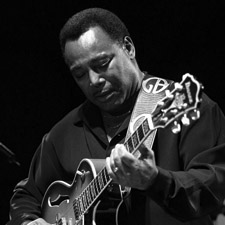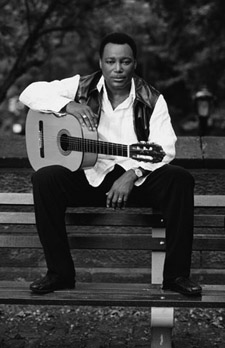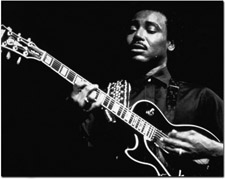George Benson
 George Benson is at the center of a unique musical story that stretches all the way back to his early childhood in Pittsburgh. At age eight, he was already singing and playing the ukulele in local nightclubs. By his teenage years, he had switched from ukulele to guitar, and had stopped singing to focus more on his instrumental work. His musical sensibilities shifted toward jazz, due to his exposure to records by jazz legends Wes Montgomery, Charlie Christian and Charlie Parker.
George Benson is at the center of a unique musical story that stretches all the way back to his early childhood in Pittsburgh. At age eight, he was already singing and playing the ukulele in local nightclubs. By his teenage years, he had switched from ukulele to guitar, and had stopped singing to focus more on his instrumental work. His musical sensibilities shifted toward jazz, due to his exposure to records by jazz legends Wes Montgomery, Charlie Christian and Charlie Parker.
By the early ’60s, Benson had joined jazz organist Jack McDuff’s band – a consummate musician who took many young players on the road to help fortify their technique. “Jack turned me on to a lot of stuff,” muses Benson. “A lot of the jazz tunes we played together were danceable, and that furthered my understanding of what people wanted. When jazz was danceable, it was king. The  intellectual stuff that came later on – Charlie Parker and all that – turned toward a brainier sound. That was good, and I dug it”.
intellectual stuff that came later on – Charlie Parker and all that – turned toward a brainier sound. That was good, and I dug it”.
He left to form his own band and launch his solo career with the 1964 album, The New Boss Guitar (a nod to Montgomery’s album, Boss Guitar, released just a year earlier). The album caught the attention of legendary talent scout John Hammond. Benson recorded two solo albums for Columbia and played session dates for numerous other artists, including Miles Davis’ 1968 opus, Miles in the Sky.
He left Columbia in the late ’60s and recorded on a number of labels for the next several years. All the while, he’d been looking for a way to redevelop his vocals and make them part of his overall repertoire, but most of the producers and record executives at the time dismissed the idea, which became a source of growing frustration. But producer Tommy LiPuma saw the idea differently, and the result was Breezin’, the 1976 blockbuster pop album that marked the beginning of a long association with Warner Brothers. The first Benson record to achieve platinum sales, Breezin’ yielded a number of hits, including the instrumental title track, the update of Leon Russell’s “This Masquerade” and “Give Me The Night.”
Throughout the remainder of the ’70s and into the ’80s, Benson and LiPuma crafted a string of great pop records that collectively cemented the guitarist’s global reputation as a singer. In the mid-’90s, Benson followed LiPuma to the GRP label, where the two basically picked up where they’d left off at Warner Brothers.
Since the start of the millennium, Benson has shown no signs of slowing down and has a heavy touring schedule.

